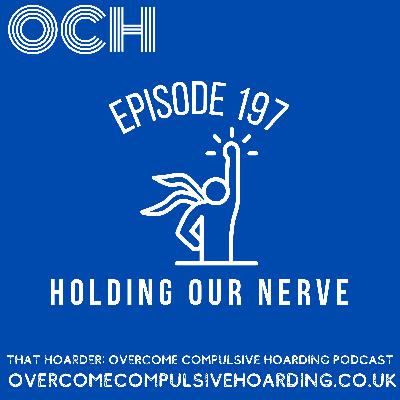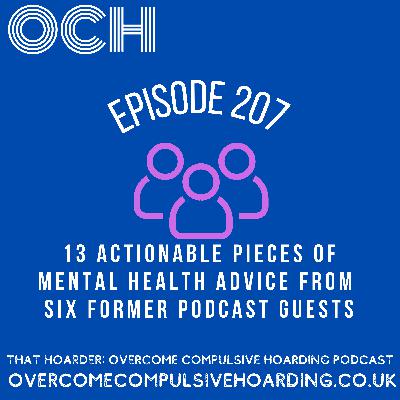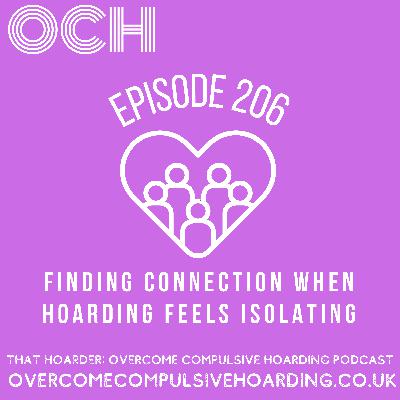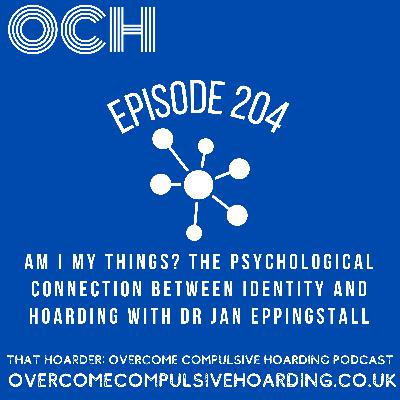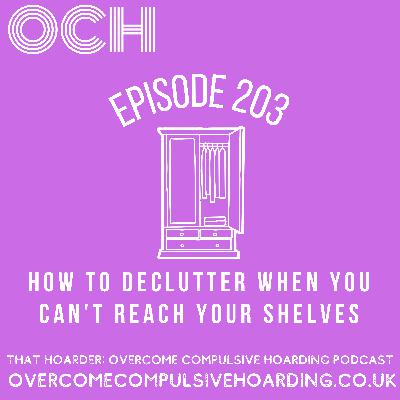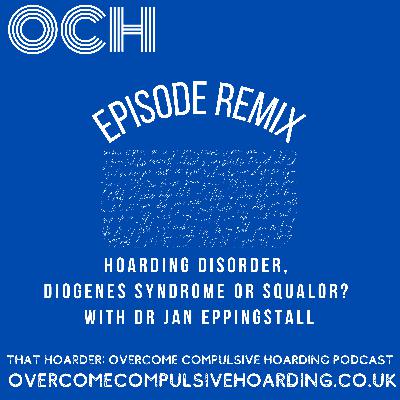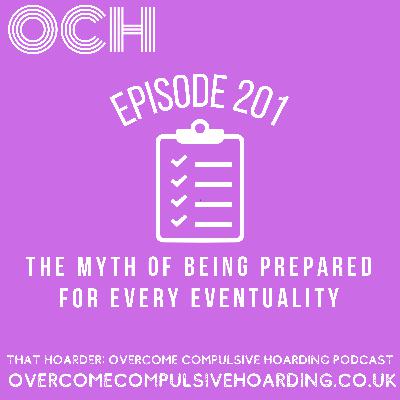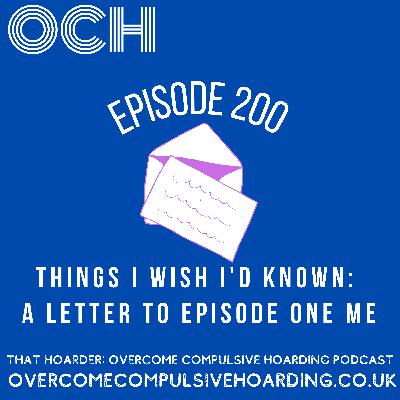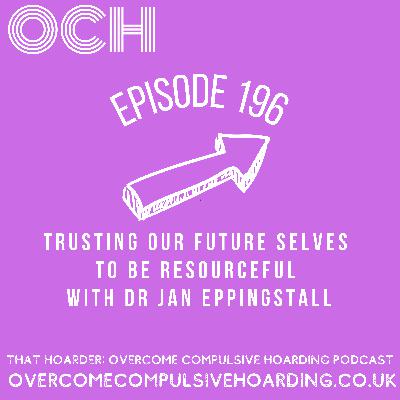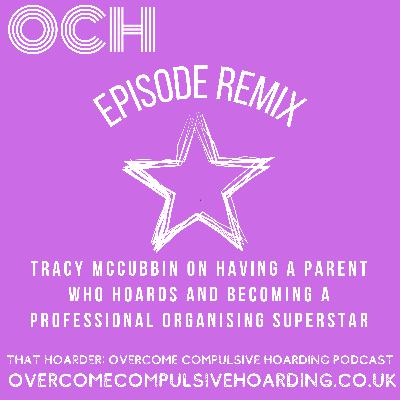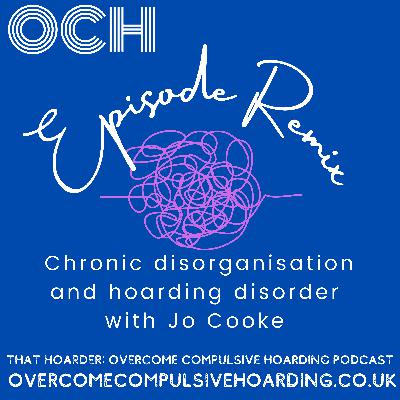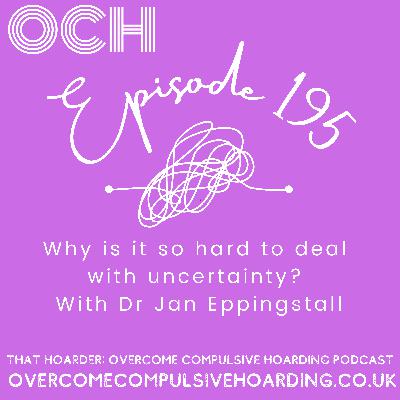#197 Holding our nerve: navigating urges and building tenacity in breaking hoarding behaviours
Update: 2025-09-13
Description
- Come to a Dehoarding Accountability Zoom Session: http://www.overcomecompulsivehoarding.co.uk/ticket
- Subscribe to the podcast: https://www.overcomecompulsivehoarding.co.uk/subscribe
- Podcast show notes, links and transcript: http://www.overcomecompulsivehoarding.co.uk/
Today I’m talking about what it really takes to stick to our dehoarding decisions - how to resist urges, tolerate discomfort, and actually follow through, even when it’s tough. I’ll share why holding our nerve matters, what gets in the way, and some strategies to help avoid falling back into old patterns. Plus, there’s a practical top tip at the end to help boost your self-care this month.
- Holding Our Nerve
- Explanation of the gap between deciding to act and actually taking action when dehoarding
- Definition in Hoarding Context
- Persistence in sticking to healthy, productive decisions
- Managing urges to revert to hoarding behaviours
- Commitment to goals for sustainable progress
- Reference to Amelia Earhart’s quote about decision-making and tenacity
- “Paper tigers” explanation – things we fear that seem big but aren’t as powerful as they appear
- Application to Hoarding Behaviour
- Resisting Acquiring Items
- Examples: bargain shopping, free items, online shopping temptations
- Enduring Discomfort in Dehoarding
- Tolerating emotional and physical discomfort during the dehoarding process
- Maintaining Long-term Commitment
- Remembering reasons for setting goals in the first place
- Avoiding short-term gratification and honouring original decisions
- Hoarding as a Coping Mechanism
- Exploration of how and why hoarding behaviours develop and persist
- Acknowledging that they once served a purpose and understanding possible current motivations
- Strategies for Holding Our Nerve
- Breaking the Cycle
- Recognising urges and patterns
- Learning from successes and setbacks
- Decision-Making vs. Tenacity
- Differentiating between difficulty in deciding versus following through
- The importance of honouring previous decisions
- Reminders and Motivation
- Recalling the “why” behind goals (better living conditions, consequences, self-improvement)
- Using motivational tools (e.g., visual reminders, Pinterest boards)
- Compassion and Flexibility
- Allowing for Mistakes
- Emphasis on not seeking perfection, just consistent progress
- Adjusting Expectations
- Recognising that personal best varies from day to day
- Trusting the process, even during discomfort
- Building the “Dehoarding Muscle”
- Each successful decision builds strength and determination for future efforts
- Identifying and Addressing Triggers
- Internal Triggers
- Decision fatigue, emotional attachment, mental and physical exhaustion, anxiety or depression
- Self-doubt and “what if I need it?” thoughts
- External Triggers
- Specific shops, websites, sales, or social pressure from others
- Discouragement, overwhelm, enticing offers, or resistance from people uncomfortable with change
- Planning Around Triggers
- Identifying personal stumbling blocks and creating plans to avoid or counteract them
- Coping Tactics for Urges
- Acknowledgment & Self-Reflection
- Naming feelings and urges to reduce their power
- Recognising patterns and underlying needs (e.g., hunger, mood)
- Nervous System Regulation
- Using grounding techniques, calming objects, self-talk, and other anxiety-management tools
- Allowing oneself to feel discomfort without acting on it
- Dealing with “What If I Need It?” Thoughts
- Trusting future self to be resourceful
- Breaking down hypothetical worries and seeking alternatives
- Importance of Support Systems
- Building and Using Support Networks
- Therapists, friends, accountability groups (Zoom sessions), online communities
- Support as both emotional (crying, laughing) and practical (advice, checks on decisions)
- Loneliness and Variations in Support
- Recognition that not everyone has support, with encouragement to proactively seek help
- Mention of a related episode on loneliness
- Self-Compassion and Learning from Setbacks
- Self-forgiveness and Reflection
- Importance of forgiving oneself instead of engaging in self-punishment
- Analysing situations where nerve was lost to prevent future recurrences
- Practical Planning
- Strategies for managing triggers, such as only shopping with someone else or removing items quickly
Links
- Podcast ep 196: Trusting our future selves to be resourceful with Dr Jan Eppingstall
- Podcast episode 174: How to feel grounded when we’re overwhelmed or dysregulated using ventral vagal spaces and touchstones, with Dr Jan Eppingstall
- Podcast ep 49: Sitting with discomfort: distress tolerance and hoarding – How unconscious distress avoidance might be worsening your problems
- Podcast ep 190: What if we forgive ourselves, but now we know better, we do better? Choosing compassion over shame in hoarding disorder
- Podcast ep 130: Loneliness and hoarding with Vassia Sarantopoulou: build human connections and combat hoarding-related shame
- Action for Happiness calendar
- Come to a Dehoarding Accountability Zoom session: Accountability Booking Form
- Website: Overcome Compulsive Hoarding
- Become a Dehoarding Darling
- Submit a topic for the podcast to cover
- Questions to ask when dehoarding: https://www.overcomecompulsivehoarding.co.uk/podquestions
- Instagram: @thathoarderpodcast
- Twitter: @ThatHoarder
- Mastodon: @ThatHoarder@mastodon.online
- TikTok: @thathoarderpodcast
- Facebook: Overcome Compulsive Hoarding with That Hoarder
- Pinterest: That Hoarder
- YouTube: Overcome Compulsive Hoarding with That Hoarder
- Reddit: Overcome Compulsive Hoarding with That Hoarder subreddit
- Help out: Support this project
- Sponsor the podcast
Subscribe to the podcast
Comments
In Channel

